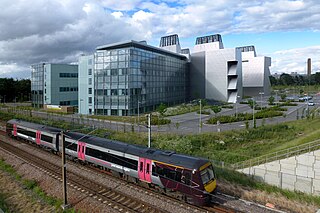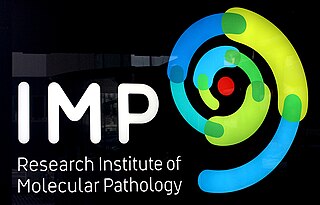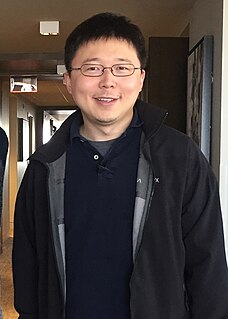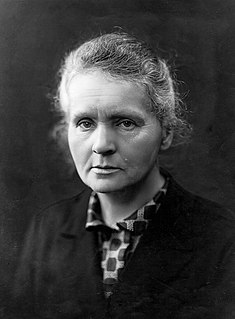
Max Ferdinand Perutz was an Austrian-born British molecular biologist, who shared the 1962 Nobel Prize for Chemistry with John Kendrew, for their studies of the structures of haemoglobin and myoglobin. He went on to win the Royal Medal of the Royal Society in 1971 and the Copley Medal in 1979. At Cambridge he founded and chaired (1962–79) The Medical Research Council (MRC) Laboratory of Molecular Biology (LMB), fourteen of whose scientists have won Nobel Prizes. Perutz's contributions to molecular biology in Cambridge are documented in The History of the University of Cambridge: Volume 4 published by the Cambridge University Press in 1992.

Sir John Cowdery Kendrew, was an English biochemist, crystallographer, and science administrator. Kendrew shared the 1962 Nobel Prize in Chemistry with Max Perutz, for their work at the Cavendish Laboratory to investigate the structure of heme-containing proteins.

The Medical Research Council (MRC) Laboratory of Molecular Biology (LMB) is a research institute in Cambridge, England, involved in the revolution in molecular biology which occurred in the 1950–60s. Since then it has remained a major medical research laboratory at the forefront of scientific discovery, dedicated to improving the understanding of key biological processes at atomic, molecular and cellular levels using multidisciplinary methods, with a focus on using this knowledge to address key issues in human health.
Franz-Ulrich Hartl is a German biochemist and Managing Director of the Max Planck Institute of Biochemistry. He is known for his pioneering work in the field of protein-mediated protein folding and is a recipient of the 2011 Lasker Award along with Arthur L. Horwich.

The Research Institute of Molecular Pathology (IMP) is a biomedical research center, which conducts curiosity-driven basic research in the molecular life sciences.

Michael A. Marletta is an American biochemist.

Jennifer Anne Doudna is an American biochemist who has done pioneering work in CRISPR gene editing, and made other fundamental contributions in biochemistry and genetics. She received the 2020 Nobel Prize in Chemistry, with Emmanuelle Charpentier, "for the development of a method for genome editing." She is the Li Ka Shing Chancellor's Chair Professor in the Department of Chemistry and the Department of Molecular and Cell Biology at the University of California, Berkeley. She has been an investigator with the Howard Hughes Medical Institute since 1997.

Feng Zhang is a Chinese-American biochemist. Zhang currently holds the James and Patricia Poitras Professorship in Neuroscience at the McGovern Institute for Brain Research and in the departments of Brain and Cognitive Sciences and Biological Engineering at the Massachusetts Institute of Technology. He also has appointments with the Broad Institute of MIT and Harvard. He is most well known for his central role in the development of optogenetics and CRISPR technologies.
The Otto Warburg Medal is awarded annually by the German Society for Biochemistry and Molecular Biology to honour scientists who have contributed important work in the field of biological chemistry. It is named after Otto Warburg, a renowned German physiologist and Nobel Prize laureate. It was first awarded on his 80th birthday on 8 October 1963.

This is a list of women chemists. It should include those who have been important to the development or practice of chemistry. Their research or application has made significant contributions in the area of basic or applied chemistry.

Emmanuelle Marie Charpentier is a French professor and researcher in microbiology, genetics, and biochemistry. Since 2015, she has been a Director at the Max Planck Institute for Infection Biology in Berlin. In 2018, she founded an independent research institute, the Max Planck Unit for the Science of Pathogens. In 2020, Charpentier and American biochemist Jennifer Doudna of the University of California, Berkeley, were awarded the Nobel Prize in Chemistry "for the development of a method for genome editing". This was the first science Nobel ever won by two women alone.

Virginijus Šikšnys is a Lithuanian biochemist and a professor at Vilnius University. He is a chief scientist at the Vilnius University Institute of Biotechnology.

The Vienna BioCenter is a cluster of life science research institutes and biotechnology companies located in the 3rd municipal District of Vienna, Austria. It grew around the Research Institute of Molecular Pathology (IMP), which opened in 1988. The entities at the Vienna BioCenter employ more than 2,000 people, including 600 students.

Erwin Friedrich Wagner is an Austrian biochemist known for his research on the molecular basis of cancer and associated conditions such as inflammation and cachexia. He was Deputy Director of the Spanish National Cancer Research Center (CNIO) in Madrid, Spain until 2019. Since 2019, Wagner is a group leader affiliated with the Medical University of Vienna.
Arndt von Haeseler is a German bioinformatician and evolutionary biologist. He is the scientific director of the Max F. Perutz Laboratories at the Vienna Biocenter and a professor of bioinformatics at the University of Vienna and the Medical University of Vienna.
Sarah E. O'Connor is an American molecular biologist working to understand the molecular machinery involved in assembling important plant natural products - vinblastine, morphine, iridoids, secologanin - and how changing the enzymes involved in this pathway lead to diverse analogs. She was a Project Leader at the John Innes Centre in the UK between 2011 and 2018. O'Connor was appointed by the Max Planck Society in 2018 to head the Department of Natural Product Biosynthesis at the Max Planck Institute for Chemical Ecology in Jena, Germany, taking up her role during 2019.

CRISPR gene editing is a genetic engineering technique in molecular biology by which the genomes of living organisms may be modified. It is based on a simplified version of the bacterial CRISPR-Cas9 antiviral defense system. By delivering the Cas9 nuclease complexed with a synthetic guide RNA (gRNA) into a cell, the cell's genome can be cut at a desired location, allowing existing genes to be removed and/or new ones added in vivo.

Luciano Marraffini is an Argentinian-American microbiologist. He is currently professor and head of the laboratory of bacteriology at The Rockefeller University. He is recognized for his work on CRISPR-Cas systems, being one of the first scientists to elucidate how these systems work at the molecular level.















